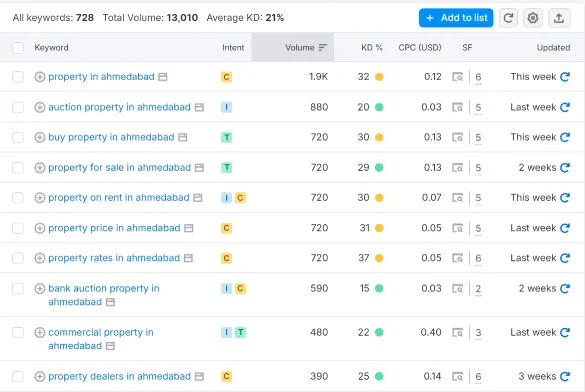
If you’ve been tasked with handling SEO for a real estate brand, you probably already know it’s a whole different ball game compared to other industries. Not to mention, your site needs to be loaded with compelling content and optimised for location-based searches.
So how do you make sure your client’s website starts ranking and you are able to drive good results for the SEO company.
In this blog, we will tell you some real estate SEO strategies that will help you establish a foundation and give you a basic idea about SEO for real estate.
Table of contents
- Know Your Audience and Target Keywords
- Fine-Tune Your On-Page SEO
- Focus More on Local SEO
- Make Sure Your Site is Optimised for Mobile
- Do Content Marketing Beyond Just Blog Posts
- Earn Authority Links
- Conclusion
- Frequently Asked Questions
1. Know Your Audience and Target Keywords
Knowing your target audience is the first step of any SEO strategy. In this case, you could cater to real estate buyers, sellers and investors depending on your client’s business.
You should know that they come from different backgrounds. Perhaps they are NRIs looking to invest in luxury flats or some middle-income families searching for budget-friendly homes.
You should narrow it down and understand their pain points and search behaviour. This can guide your keyword strategy.
Here’s how to approach your keyword strategy.
- Understand Buyer Intent: Intent differs with keywords. A user searching for “3 BHK flats in Satellite, Ahmedabad” is closer to making a purchase decision compared to someone searching for “best areas to live in Ahmedabad.” Use tools like Google’s Keyword Planner and Semrush to find keywords with a high conversion intent.
- Include Hyperlocal Keywords: Don’t stop at general location keywords. Think micro-level. Phrases like “properties near ISKCON Temple” or “flats near Thaltej Lake” are extremely specific but highly valuable. In Ahmedabad, people are particular about neighbourhoods, so this strategy makes your SEO efforts much more targeted.
- LSI Keywords (Latent Semantic Indexing): LSI keywords help search engines understand the context of your page. For example, if your main keyword is “buy homes in Ahmedabad,” include related terms like “Ahmedabad real estate market trends” or “best builders in Ahmedabad.”
2. Fine-Tune Your On-Page SEO
Implement structured data (schema markup) specific to real estate.
With real estate schema, Google can display rich snippets that show property price, location and availability directly in search results.
This not only improves click-through rates but also helps in local SEO rankings.
3. Focus More on Local SEO
Local SEO is essential for real estate brands. People looking for a property will always search based on a specific location and optimising for local SEO ensures you capture that audience effectively.
Take advantage of the Google My Business (GMB) post feature to share new property listings, open house events or even recent blog posts. Since these posts appear in local search results, they can drive more traffic directly from Google Search and Maps.
Additionally, include an FAQ section that addresses local queries, such as “What’s the average price of a 3 BHK flat in Bodakdev?” or “How far is Bopal from SG Highway?” This improves your chances of ranking for voice search queries and increases local relevance.
Also, don’t be inconsistent for NAP. Inconsistencies in Name, Address and Phone (NAP) across the web can harm your local SEO.
Ensure that all your citations on local directories (like Justdial, Sulekha and MagicBricks) have the same information.
Encourage your clients to actively respond to reviews on Google My Business. Positive engagement boosts your ranking while addressing negative reviews shows prospective buyers that the brand cares about customer feedback.
4. Make Sure Your Site is Optimised for Mobile
Buyers also search properties on Google. Look at the keywords in this screenshot and you will know.

And it’s quite possible that they might search for this using their phone. If you haven’t optimised it for mobile at this point, you must!
Because a slow or poorly designed mobile site can drastically increase bounce rates, costing your client valuable leads.
Here are a few mobile optimisation tips that you can start implementing right away.
- Ensure Click-to-Call Functionality: Real estate buyers often want to directly contact the seller. Ensure that all phone numbers are clickable so users can make calls without having to manually dial.
- Fast-loading Images: Real estate sites are typically image-heavy, showcasing properties through high-quality photos. Ensure these images are compressed and optimised for mobile devices to prevent slow load times, which can increase bounce rates.
5. Do Content Marketing Beyond Just Blog Posts
Content marketing for real estate SEO is more than just blogging. It’s about creating a content strategy that positions your brand as a thought leader and a trustworthy source of information for buyers and investors.
Consider integrating mortgage calculators, property price trend graphs or even local area guides directly into your website.
Look how Aditya Birla has integrated mortgage calculator

You can carry out industry research and find some tools like these that are valuable for buyers.
These tools not only enhance user experience but also improve dwell time—both of which are beneficial for SEO.
You can also create long-form content about specific Ahmedabad neighbourhoods, including information about local amenities, schools, parks, transport links and property prices.
These guides can also be used as lead magnets—offering them in exchange for an email subscription.
6. Earn Authority Links
Backlinks are one of the most important ranking factors and earning them in the real estate niche can be tough but highly rewarding.
Follow these techniques for link-building.
- Host Webinars or Real Estate Market Updates Sessions: Organise online events such as webinars or market update sessions. You can then promote these on local news sites, real estate portals and industry blogs. After the event, follow up with a press release or a blog post, both of which can earn you backlinks.
- Collaborate with Local Influencers and Property Bloggers: Ahmedabad has several local bloggers and influencers in the real estate space. By collaborating with them, you can gain valuable backlinks and also tap into their audience base.
Also Read: Top 5 Real-Estate Influencers in Ahmedabad.
- See If Your Clients Can Sponsor Local Events: Whether it’s sponsoring a local real estate expo or being part of a community event, these sponsorships often lead to mentions on local websites, which helps in earning high-quality local backlinks.
Conclusion
SEO for a real estate brand might sound challenging at first. But it will eventually get easy when you research well and keep updating your strategies.
Start by understanding the real-estate audience. Try to learn which income group they fall into, why they buy properties etc and tailor your keyword strategy accordingly.
Then, optimise your on-page while focusing on a mobile-first approach. Don’t forget that content marketing and backlink building will provide long-term value, positioning your real estate brand as a trusted source of information.
Lastly, if you are still unsure, connect with your peers working at a real estate marketing agency and discuss this. Their insights can also help you go a long way.
Cheers!



